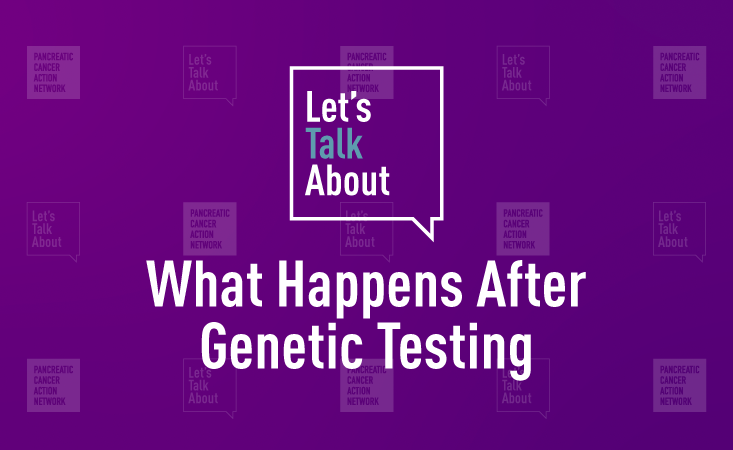
Editor’s note: Our “Let’s Talk About” series continues, focusing on testing as part of our Pancreatic Cancer Awareness Month campaign: “Talk. Test. Take Control. Three simple steps that can save your life.”
PanCAN strongly recommends that pancreatic cancer patients talk with their doctor to get genetic testing for inherited mutations to help determine if their family members may be at risk and to help the patient make more informed treatment decisions.
If you are someone who has had a parent, child or sibling diagnosed with pancreatic cancer, contact PanCAN Patient Services to help you understand why you should consider genetic testing for inherited risk.

Shenin Dettwyler, MS, CGC, genetic counselor at NYU Langone Health
In our “Let’s Talk About” series this November we have discussed what testing is, common concerns associated with genetic testing, how to prepare to meet with a genetic counselor and how to talk to your family about testing for inherited pancreatic cancer risk.
Here today to discuss how to be proactive with your health if genetic testing reveals an inherited genetic mutation that increases your risk for pancreatic cancer are genetic counselors Jessica Everett, MS, CGC, and Shenin Dettwyler, MS, CGC. They are both with the Pancreatic Cancer Center, Perlmutter Cancer Center, NYU Langone Health, where Jessica also serves as clinical assistant professor of medicine.
Before we dive in, a reminder that there are recently announced blood tests that can potentially detect the disease before it presents symptoms or is diagnosed for people who are at high risk for developing pancreatic and other cancers.
PanCAN: If genetic testing reveals a gene that puts someone at a higher risk for developing pancreatic cancer, what can they do with this information to be proactive with their health and to use it as a benefit, as opposed to something that could just cause concern or anxiety?

Jessica Everett, MS, CGC, genetic counselor at NYU Langone Health
JE: It’s very important for people to know that there are things that they and their doctors can do in the event that the test reveals higher risk. Foremost, there are screening programs for people who meet certain criteria based on family history or genetic testing results.
I encourage people to get in touch with PanCAN to find an institution near them that has a genetic testing screening program. From the perspective of screening your pancreas, there are imaging tests we can do typically on an annual basis, and some evidence shows that doing that screening allows us to find some cancers at an earlier stage than if we weren’t doing testing at all.
Also, we strongly encourage people to be connected with a research registry that can be linked to imaging screenings of their pancreas. We really need good data about screening outcomes in large numbers of people.
PanCAN Patient Services is an excellent resource for helping you find a screening program or research registry – as well as helping you find a genetic counselor near you.
And know that you can always discuss any fears or concerns with PanCAN, your doctor or your genetic counselor.
PanCAN: Are there any lifestyle changes a person can make to help them not develop pancreatic cancer if genetic testing reveals a higher risk or a gene for pancreatic cancer?
SD: Make sure you are following the same lifestyle recommendations for living a healthy life in general. Maintain a healthy weight, don’t smoke, and limit your red meat and alcohol intake. Other than making good lifestyle choices, there is really nothing further from that perspective that people with a higher risk of developing pancreatic cancer need to do differently than anyone else.
Beyond that, know the symptoms of pancreatic cancer. And remember to always be your own best advocate when it comes to your health. If something doesn’t feel right with your body, speak up – let your doctor know.














